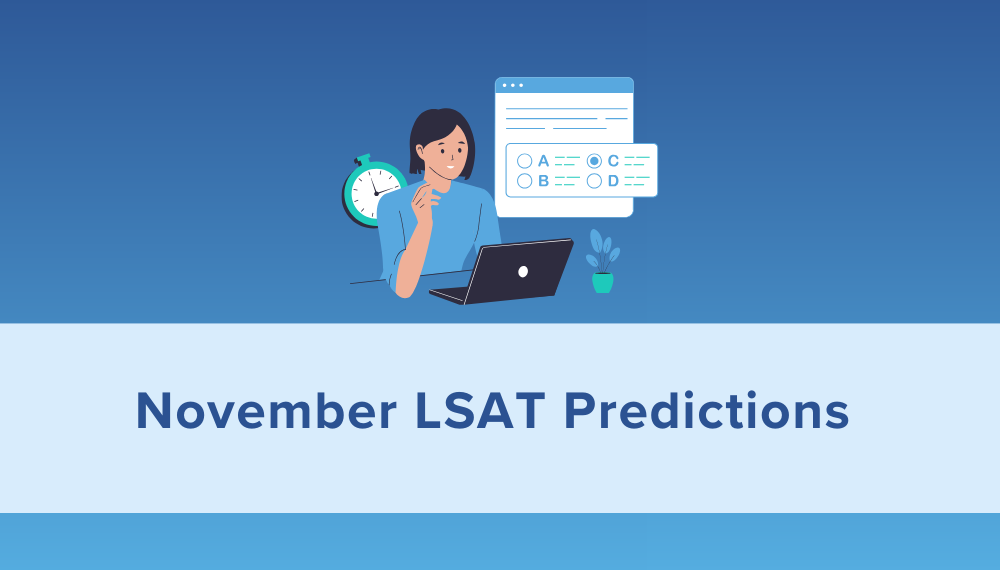It’s September and that means another LSAT is upon us. Let’s dive into what you can expect on test day!
What Will Be on the 2025 September LSAT?
Logical Reasoning
You’ll get two scored Logical Reasoning sections on the September LSAT test day (and potentially one more experimental unscored section), testing your ability to make and analyze arguments. For the past few years, the most common question types have been weaken, strengthen, necessary, soft must be true, and flaw. Notably, over half of the questions in these sections will have flawed or incomplete arguments. So, if you’re being asked to identify flaws or do something to an argument, make sure you identify the gaps in the logic or assumptions the argument is making first (as the answers always relate to these areas).
You can expect the difficulty to slowly ramp up over the course of a given section. The first ten questions are mostly easy to medium in difficulty. Expect a slight bump up in difficulty around question 11, and a steeper bump up in difficulty around question 15 or 16. This means that if you’re trying to tackle all the questions in the section, you should allocate more time for those later questions that are a bit more complex and have trickier trap answers more often.
That said, the harder questions aren’t qualitatively different than the easier ones. You just have to be a bit more precise with your language and careful to avoid making assumptions when analyzing arguments. You may want to skip these early tough questions and come back at the end. However, make sure to include guesses for any answers you don’t get to, as you don’t lose points for missed questions on the LSAT.
More LSAT Help
🧠 An Introduction to the LSAT Logical Reasoning Section
❓ The Best LSAT Guessing Strategies
Reading Comprehension
You’ll get one scored Reading Comprehension section (and potentially an unscored experimental section that can show up anywhere), which is focused on testing your ability to analyze the underlying logic and structure of a long-form passage. Despite appearing to be about comprehending details, this section is really mostly going to test your understanding of the overall purpose, subject, and viewpoints of the passage,and how the details support those viewpoints. You generally won’t be tested on random details in the abstract, as the LSAT cares much more about testing the function or purpose of those details in the larger context of the passage as a whole.
As with Logical Reasoning, Reading Comprehension sections generally ramp up in difficulty from passage to passage. However, this ramp-up is a bit less reliable than in Logical Reasoning. I’d expect a mix of subject matters on the September LSAT test day. Expect one legal, one arts, one science, and one social science passage. Identifying the subject of the passage early on can often inform what to expect for the rest of the passage. For example, arts passages tend to focus on artists’ unique contributions or art movements. History passages will often detail changes over time or the impact of important moments or movements in history. Finding the purpose or what the author cares about early on can allow you to put the other paragraphs into proper context, which in turn allows you to determine the relevance of the details in that context.
More LSAT Help
📖 How To Approach Reading Comp on the LSAT
📖 Nailing the Author’s Attitude on RC
Final Thoughts
It’s important to keep in mind that test-makers want to focus on objective elements that they can point to in wrong answers that make them wrong. That means if you are on the fence about something or a part of the answer is in the grey area, see if you can find another part of the answer that is definitively wrong to allow you to eliminate that answer. The right answers on the LSAT are right because they plausibly fit what you’re looking for and don’t do anything wrong. Each answer is only as good as its worst element, so if a tempting answer has something you can point to as wrong, it doesn’t matter how good the rest of that answer is – it’s wrong.
As you go through the LSAT sections, you should also keep in mind that each question is only worth one point, and the test is on a curve. If there is an absolutely brutal question, the curve likely will reflect that difficulty. Don’t let those tough questions impact your performance on easier questions. Stay focused on the task at hand, roll with the punches, and stay focused on seeking out that next point you can get. Short-term memory and a resilient mindset are your best friends here to achieve your dream score!
P.S. Decided to reschedule your September LSAT? Or simply getting familiar with the test before your test date later this year? We can help maximize your prep time!
Schedule a free consultation with our Student Success Team to help you find the best LSAT course to meet your scheduling needs and score goals.




